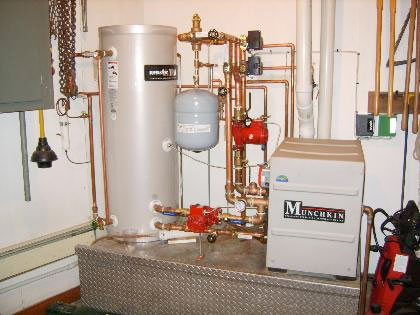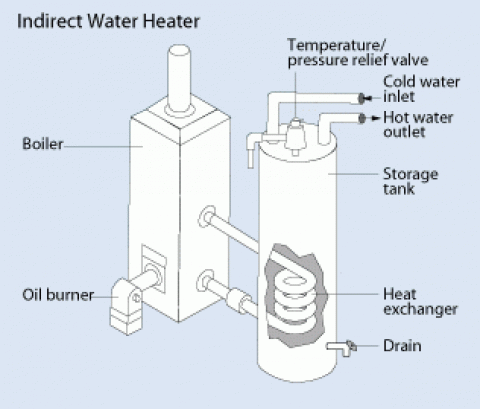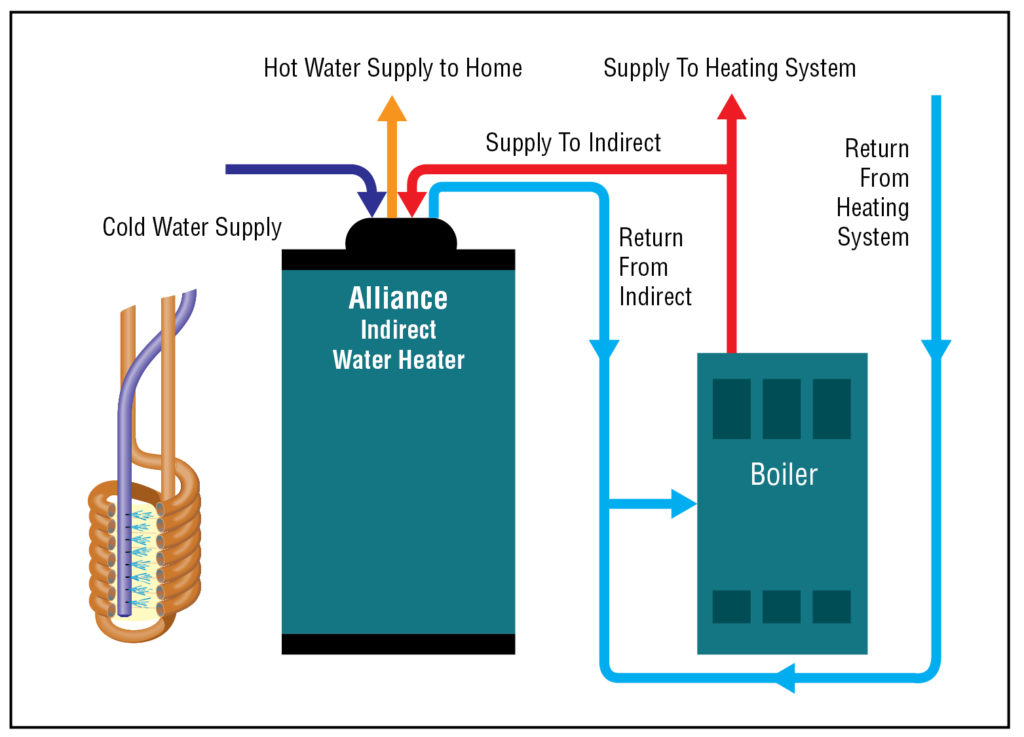You can use a hot water heater as a boiler, but it’s not ideal. Hot water heaters lack the efficiency and features of dedicated boilers.
Hot water heaters and boilers serve different purposes in heating systems. A hot water heater primarily heats water for domestic use, while a boiler provides heat for residential or commercial spaces. Boilers generate steam or hot water for heating systems, radiators, and even underfloor heating.
Using a hot water heater as a boiler can lead to inefficiencies, higher energy bills, and potential safety risks. Understanding the differences between these systems helps homeowners make informed decisions. Proper installation and maintenance are crucial for optimal performance, ensuring safety and efficiency in heating applications. Always consult a professional for tailored advice and installation.
Page Contents
- 1 Hot Water Heater Vs. Boiler: Key Differences
- 2 Essentials Of A Hot Water Heater Setup
- 3 Boiler Systems Explained
- 4 Is A Hot Water Heater Suitable For Home Heating?
- 5 Adapting A Hot Water Heater For Boiler Duties
- 6 Practical Limitations Of Using A Hot Water Heater
- 7 Case Studies: Hot Water Heater In Boiler Role
- 8 Professional Advice On Heating Solutions
- 9 Cost-benefit Analysis
- 10 Making The Choice: Boiler Or Hot Water Heater
- 11 Conclusion
Hot Water Heater Vs. Boiler: Key Differences
Hot water heaters and boilers serve different purposes. Hot water heaters provide hot water for sinks and showers. They heat water quickly for daily use. Boilers, on the other hand, heat water to create steam or hot water for heating. They often connect to radiators or underfloor heating systems.
The design of these two systems is also different. A hot water heater is usually compact and easy to install. Boilers are larger and require more space for installation. Their functionality varies as well; boilers can maintain a consistent temperature in your home.
In terms of applications, hot water heaters are ideal for quick hot water needs. Boilers excel in providing efficient heating for larger spaces. Choosing between them depends on your home heating needs.
Essentials Of A Hot Water Heater Setup
Understanding the components of a hot water heater is crucial. A typical setup includes the tank, thermostat, valves, and pipes. The tank stores water, while the thermostat controls the temperature. Valves manage water flow and pressure. Pipes connect the heater to your home’s plumbing.
Regular maintenance is key for optimal performance. Check the thermostat settings periodically. Inspect the tank for leaks or corrosion. Flush the tank to remove sediment buildup. Ensure all valves function properly. Replace any worn-out parts to prevent issues.
Following these steps helps maintain efficiency and prolongs the lifespan of your hot water heater.
Boiler Systems Explained
Boilers and hot water heaters serve different purposes. A boiler heats water and distributes steam or hot water. It is essential for heating systems. A hot water heater simply heats water for use in taps and appliances.
Core components of a boiler include the burner, heat exchanger, and controls. The burner ignites fuel to create heat. The heat exchanger transfers this heat to the water. Controls manage the system’s operation and temperature.
| Component | Function |
|---|---|
| Burner | Ignites fuel for heating |
| Heat Exchanger | Transfers heat to water |
| Controls | Manage operation and temperature |
The boiler operation cycle starts with the burner igniting. Water flows into the boiler. It heats up and creates steam or hot water. This heated water moves through pipes to radiators or faucets.
Is A Hot Water Heater Suitable For Home Heating?
Using a hot water heater as a boiler has its benefits and drawbacks. It is important to weigh the pros and cons before making a decision.
Pros:
- Lower initial cost compared to a dedicated boiler.
- Easy to install and maintain.
- Can provide both hot water and heating.
Cons:
- Less efficient for heating larger spaces.
- May not reach the temperatures needed for some systems.
- Could lead to higher energy bills over time.
Efficiency considerations are crucial. A traditional boiler is often more effective for home heating. Evaluate your home’s needs before choosing.
Adapting A Hot Water Heater For Boiler Duties
Adapting a hot water heater for boiler duties requires some modifications. First, ensure the heater can handle higher pressures. You may need to change the valves and pipes for better flow. Consider insulation to reduce heat loss. Safety is very important in this process.
Compliance with local codes is essential. Check if your heater meets safety standards. Installing a pressure relief valve is necessary to prevent accidents. Regular maintenance is crucial for safe operation.
| Modification | Requirement |
|---|---|
| Pressure Capacity | Must support higher pressure |
| Valves and Pipes | Upgrade for improved flow |
| Insulation | Reduce heat loss |
| Safety Standards | Meet local compliance codes |
Practical Limitations Of Using A Hot Water Heater
Hot water heaters are not designed for high heating capacity. They typically heat water to a set temperature. This is usually much lower than the temperature needed for heating a home. Using a hot water heater as a boiler can lead to poor performance.
Longevity and wear are major concerns. Hot water heaters are not built for constant use. Their components can wear out faster under heavy loads. This can lead to costly repairs or replacements.
Consider the following points:
- Hot water heaters are efficient for small tasks.
- Boilers are designed for larger heating needs.
- Using a hot water heater can void warranties.
- Safety risks may increase with improper use.
Case Studies: Hot Water Heater In Boiler Role
Using a hot water heater as a boiler can be effective. Many people have found success in this adaptation. The temperature and pressure settings must be adjusted properly. This ensures safe and efficient operation.
Some common successful adaptations include:
- Heating water for radiant floor systems.
- Providing hot water for baseboard heating.
- Using it in hydronic heating systems.
Challenges can occur during these adaptations. Compatibility with existing systems is crucial. Installation costs may rise if modifications are needed. Regular maintenance is essential for safety and efficiency.
Understanding these factors can help in making informed decisions. Always consult a professional before major changes.

Credit: www.buildinggreen.com
Professional Advice On Heating Solutions
Using a hot water heater as a boiler can be tricky. It may not provide enough heat. Consulting HVAC experts is a smart choice. They can give you the best advice.
Experts will look at your home’s needs. They can suggest the right systems. Customized heating strategies can save you money. They ensure your home stays comfortable year-round.
| Heating System | Pros | Cons |
|---|---|---|
| Hot Water Heater | Lower initial cost | Less efficient for heating |
| Boiler | More efficient heating | Higher installation cost |
Cost-benefit Analysis
The initial investment for a hot water heater can vary. Typically, a hot water heater costs less than a boiler. Most models are easier to install. This means lower installation costs for homeowners.
Operational costs over time are also important. Hot water heaters are generally more energy-efficient. They often require less maintenance than traditional boilers. This can lead to savings on repair costs.
| Cost Type | Hot Water Heater | Boiler |
|---|---|---|
| Initial Investment | Lower | Higher |
| Maintenance | Less Frequent | More Frequent |
| Energy Efficiency | Higher | Lower |

Credit: www.energy.gov
Making The Choice: Boiler Or Hot Water Heater
Choosing between a boiler and a hot water heater is important. Each option has its benefits. A boiler can provide heat for your home. It also heats water for daily use. A hot water heater mainly focuses on providing hot water. It may not heat your home effectively.
Consider these factors before making your choice:
- Energy efficiency: Boiling water uses more energy.
- Space: Boilers often need more room.
- Cost: Installation and maintenance can vary.
- Usage: Think about your hot water needs.
Final recommendations include assessing your specific needs. A boiler works well for heating and hot water. A hot water heater is best for hot water alone.

Credit: www.usboiler.net
Conclusion
Using a hot water heater as a boiler can be tempting, but it’s not advisable. The two systems serve different purposes and have unique designs. Safety and efficiency should always come first. For optimal heating solutions, consider investing in a proper boiler.
This ensures reliable performance and peace of mind for your home.
